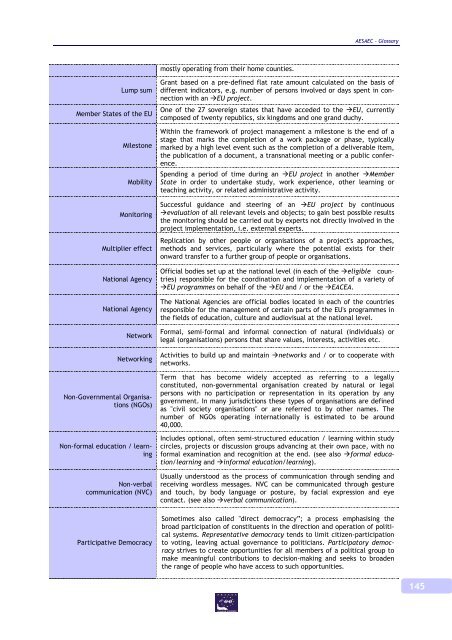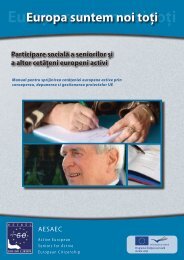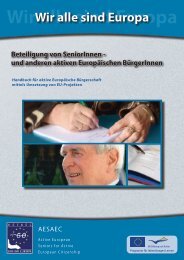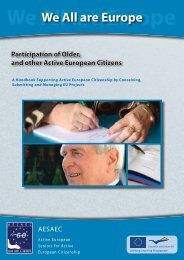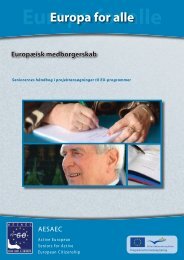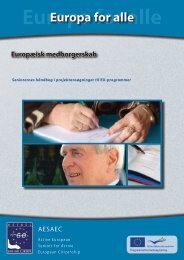We All are Europe - AESAEC
We All are Europe - AESAEC
We All are Europe - AESAEC
Create successful ePaper yourself
Turn your PDF publications into a flip-book with our unique Google optimized e-Paper software.
<strong>AESAEC</strong> – Glossary<br />
mostly operating from their home counties.<br />
Lump sum<br />
Member States of the EU<br />
Milestone<br />
Mobility<br />
Monitoring<br />
Multiplier effect<br />
National Agency<br />
National Agency<br />
Network<br />
Networking<br />
Non-Governmental Organisations<br />
(NGOs)<br />
Non-formal education / learning<br />
Non-verbal<br />
communication (NVC)<br />
Participative Democracy<br />
Grant based on a pre-defined flat rate amount calculated on the basis of<br />
different indicators, e.g. number of persons involved or days spent in connection<br />
with an EU project.<br />
One of the 27 sovereign states that have acceded to the EU, currently<br />
composed of twenty republics, six kingdoms and one grand duchy.<br />
Within the framework of project management a milestone is the end of a<br />
stage that marks the completion of a work package or phase, typically<br />
marked by a high level event such as the completion of a deliverable item,<br />
the publication of a document, a transnational meeting or a public conference.<br />
Spending a period of time during an EU project in another Member<br />
State in order to undertake study, work experience, other learning or<br />
teaching activity, or related administrative activity.<br />
Successful guidance and steering of an EU project by continuous<br />
evaluation of all relevant levels and objects; to gain best possible results<br />
the monitoring should be carried out by experts not directly involved in the<br />
project implementation, i.e. external experts.<br />
Replication by other people or organisations of a project's approaches,<br />
methods and services, particularly where the potential exists for their<br />
onward transfer to a further group of people or organisations.<br />
Official bodies set up at the national level (in each of the eligible countries)<br />
responsible for the coordination and implementation of a variety of<br />
EU programmes on behalf of the EU and / or the EACEA.<br />
The National Agencies <strong>are</strong> official bodies located in each of the countries<br />
responsible for the management of certain parts of the EU's programmes in<br />
the fields of education, culture and audiovisual at the national level.<br />
Formal, semi-formal and informal connection of natural (individuals) or<br />
legal (organisations) persons that sh<strong>are</strong> values, interests, activities etc.<br />
Activities to build up and maintain networks and / or to cooperate with<br />
networks.<br />
Term that has become widely accepted as referring to a legally<br />
constituted, non-governmental organisation created by natural or legal<br />
persons with no participation or representation in its operation by any<br />
government. In many jurisdictions these types of organisations <strong>are</strong> defined<br />
as "civil society organisations" or <strong>are</strong> referred to by other names. The<br />
number of NGOs operating internationally is estimated to be around<br />
40,000.<br />
Includes optional, often semi-structured education / learning within study<br />
circles, projects or discussion groups advancing at their own pace, with no<br />
formal examination and recognition at the end. (see also formal education/learning<br />
and informal education/learning).<br />
Usually understood as the process of communication through sending and<br />
receiving wordless messages. NVC can be communicated through gesture<br />
and touch, by body language or posture, by facial expression and eye<br />
contact. (see also verbal communication).<br />
Sometimes also called "direct democracy”; a process emphasising the<br />
broad participation of constituents in the direction and operation of political<br />
systems. Representative democracy tends to limit citizen-participation<br />
to voting, leaving actual governance to politicians. Participatory democracy<br />
strives to create opportunities for all members of a political group to<br />
make meaningful contributions to decision-making and seeks to broaden<br />
the range of people who have access to such opportunities.<br />
145


